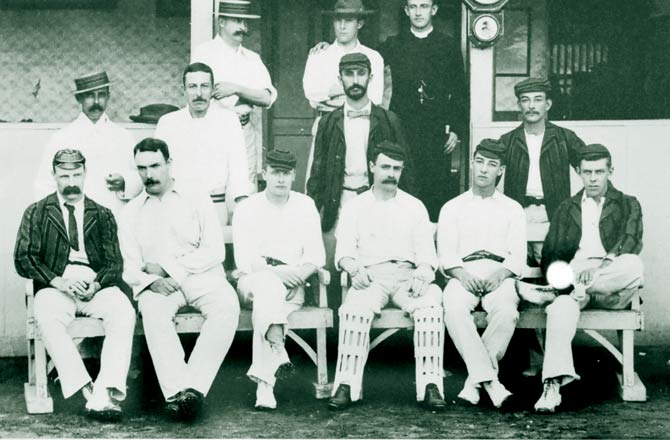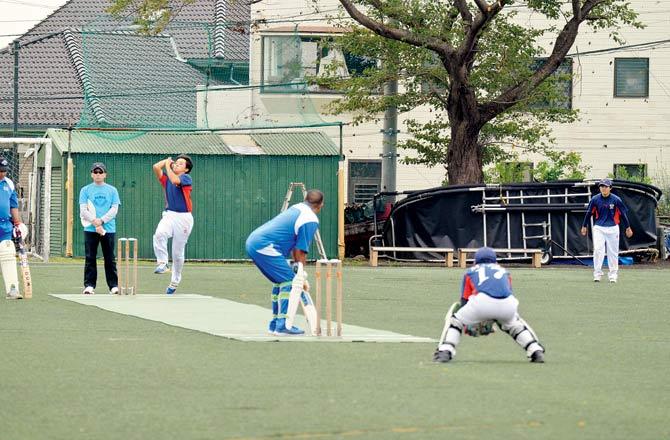Suvam Pal traces the history of Yokohama CC while covering the ongoing rugby World Cup in Japan where the willow game arrived before football; cricket was played there at many leading schools from 1868-1912

An Illustration of the first rugby match played in Japan in 1866. courtesy Graphic, April 18, 1874 From the collection of Mike Galbraith
Yokohama: This year's rugby World Cup in Japan hogged the headlines for its spectacular arrival in the Asian continent and the hosts underlining a slew of coming of age performances to make the baseball, sumo wrestling and football-loving nation go crazy, another British-invented sports, cricket, has got some interesting connections to the blue riband event of the sport that was invented by a certain Matthew Webb Ellis in the Victorian-era eponymous school.
ADVERTISEMENT
Ellis figures on trophy
Lancashire-born, Oxford-educated Ellis, whose name is given to the winners' silverware of each editions of the rugby World Cup, was credited by historians as an ordinary cricketer with a rather insignificant one match first-class career as he featured in the 1827 varsity match — the inaugural contest — and scored just 12 runs. Although it's been still disputed whether Ellis's "picking up the ball and running" during a football practice in the school in 1823 can qualify him to be the inventor of the sport, but the gentlemen's game has made its presence felt in this year's rugby World Cup.
Interestingly, both the colonial sports, rugby and cricket, were invented by the British and traversed across different colonies almost simultaneously and around the same time with the same set of people, the British services personnel.

The YC&AC team in a bygone era
The two sports arrived in Japan around the same time and significantly quite ahead of football. More importantly, both the games made its first footfall in the far-Eastern country at the same place and one man played a pivotal role in patronising both the sports. A 150-year-old club in Yokohama played a stellar role in introducing almost every western sport in Japan by the non-Japanese in the country and the Yokohama Country & Athletic Club (YC&AC), which was located where the Yokohama Stadium stands today, was the driving force behind that.
Incidentally, both cricket and rugby (along with hockey, athletics, horse racing, football and tennis) were introduced to Japan for the first time in the city's burgeoning expat clubs in the second half of the 19th century.
According to club historian Mike Galbraith, "The history of the YC&AC has always been recognised as starting one day in 1868 in the dining room of the Yokohama home of 23-year-old Scotsman JP [James Pender] Mollison, who was mad about cricket and who had only recently become a local resident. On that day, he and his cricketing friend Ernest Price and a few others founded the Yokohama Cricket Club [YCC] with Mollison as the president and Price as secretary."

A cricket match at the Yokohama Cricket & Athletic Club
Historically, in 1868, the eastern Asian country entered its much-talked-about Meiji era with the Meiji Restoration taking place and paving the way for foreign trade in the land that was once out of bound for the European merchants. A slew of other sports clubs did exist before Mollison's arrival from Shanghai in 1866 and the Yokohama Foot Ball Club (YFBC), which is credited to have staged the first rugby match in Asia and created history as the first-ever rugby club in the continent, was one of those which was founded by British military officers and western residents of the Yokohama Foreign Settlement near the port city's China Town.
Cricketer and tea merchant
Glasgow-born Mollison, who was a decent opening bowler and a mediocre defensive batsman at No. 4 or 5, was a well-known tea merchant of that era in Japan and also a direct selling Japanese agent for Alfred Nobel apart from being the first importer of dynamite in Japan. He and his club were the fulcra of sporting activities in Yokohama as the YCC reclaimed swampland at the site of an erstwhile brothel in the name of Gangiro (shut down in 1866) and started playing the gentlemen's game at the newly-built ground in Yokohama Koen. However, Galbraith wrote in the September 2019 edition of the YC&AC magazine, Connect, "… 'lost' first cricket match played in 1863 when the cricket history of Japan had long been said to have started in 1864." Subsequently, in 1884, Mollison supervised the merger of the YFBC, the Baseball club and the Athletics Club with the YCC to create a new entity called the Yokohama Cricket & Athletic Club (YC&AC).
Two years later, the historic club also featured in arguably the first-ever recorded game of football played in Japan. A small newspaper article, retrieved by Galbraith and published in the Hiogo News (a Kobe publication) on November 23, 1886, wrote, "There will be a football match this afternoon between a team from HMS Constance and Sylvia and the members of the KR&AC.The game will be played under the Association rules..."
Rugby on a cricket ground!
The first-ever rugby match involving a Japanese team was played on the cricket ground of in the Yokohama Park between YC&AC and Keio Gijuku (Keio University) a decade after rugby was introduced to Keio students in Tokyo in 1899 by two Cambridge University graduates — EB Clarke, a Yokohama-born English lecturer, and Ginnosuke Tanaka.
At the same time, influenced by the popular cricket matches played by the non-Japanese clubs, cricket found a place in the curriculum of many schools in Japan in that era and was taught and played by many leading schools for much of the Meiji Period (1868-1912) in Japan. The integrated club started drawing more members and were basking under its glory before an eviction order from the Japanese authorities forced the burgeoning club to relocate to its current location in Yaguchidai. The club was registered as a new legal entity under the Japanese law in 1912, but the word 'Cricket' in its name became the biggest causality of the entire transformation and relocation process. 'Cricket' was replaced by 'Country' in the club's name and got stuck to that till date.
Effects of World War I
The World War I followed by the Great Earthquake made some huge impacts on the club's fortune and more importantly, its co-founder Mollison's life. One of his sons and the son's wife were the fatalities of the devastating quake even though Mollison survived. Sadly, the deceased son was the captain of rugby at the club.
Suvam Pal is an international journalist covering the ongoing rugby World Cup in Japan
Catch up on all the latest sports news and updates here. Also download the new mid-day Android and iOS apps to get latest updates
 Subscribe today by clicking the link and stay updated with the latest news!" Click here!
Subscribe today by clicking the link and stay updated with the latest news!" Click here!






